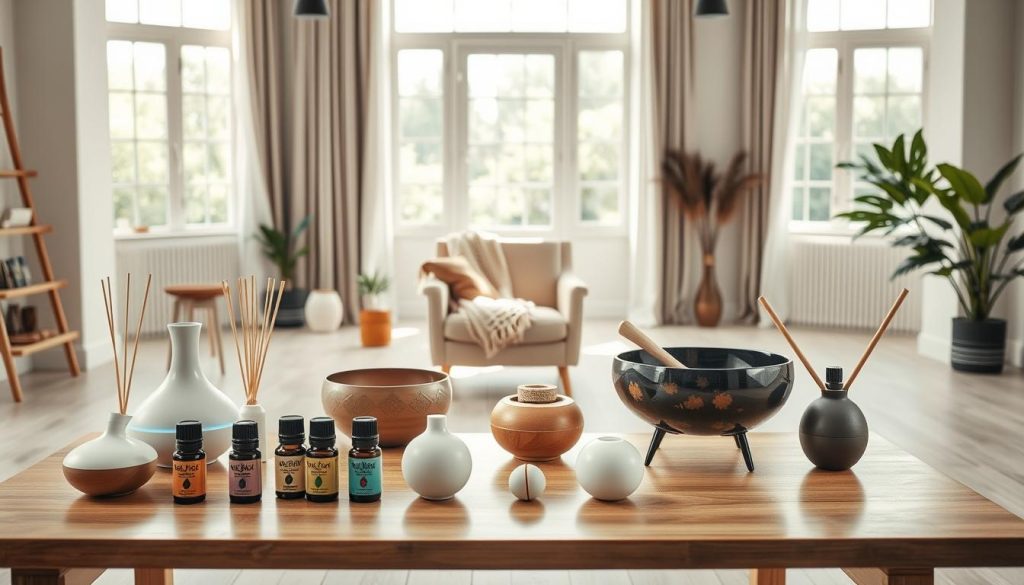Sensory wellness is changing how we think about health. It uses sound, light, and smell to improve our well-being. By adding these elements to our daily lives, we can take better care of ourselves.
These practices help us relax and reduce stress. They also boost our mental health. Learning about sensory experiences can help us find inner peace and health.
Exploring sensory wellness, we find that sound, light, and smell can create harmony. This harmony leads to a balanced life.
Key Takeaways
- Sensory wellness enhances holistic health and promotes well-being.
- Integrating sound therapy, light therapy, and aromatherapy can reduce stress.
- Sound and light have profound effects on mental health.
- Aromatherapy utilizes essential oils to improve mood and relaxation.
- Understanding sensory experiences empowers individuals to achieve better health.
- A balanced environment is key for optimal mental and physical health.
Understanding Sensory Wellness
Sensory wellness uses sound, light, and smell to improve mental and emotional health. It connects with mindfulness and self-care. Mindful sensory activities help find balance and relaxation, boosting overall well-being.
What is Sensory Wellness?
Sensory wellness taps into the senses to improve mental health. It helps find peace in daily life by focusing on sights, sounds, and smells. These elements are key in self-care, leading to better mindfulness and emotional balance.
The Role of Sensory Experiences in Wellbeing
Nature’s sounds and smells, like a stream or pine trees, boost comfort. Being in nature reduces stress and anxiety. Sensory experiences in daily life strengthen well-being, helping us connect with ourselves and improve mental health.
The Science Behind Sound Therapy
Sound therapy is getting more attention for its effects on brain health and wellness. It shows how sound can change our mental states, helping us relax and manage stress. This method uses various techniques to improve our mental health.
How Sound Affects the Brain
Studies show that sound changes how our brain works. It affects parts of the brain that handle emotions and thinking. Listening to calming sounds can change brain waves and help us relax.
This can lead to a sense of peace, which is good for our brain health.
Types of Sound Therapy Techniques
There are many sound therapy methods. These include:
- Listening to nature sounds, which promotes a tranquil environment.
- Engaging in music therapy sessions tailored to individual needs.
- Participating in sound baths that immerse participants in harmonic vibrations.
Each technique aims to boost wellness and help the mind and body heal.
Benefits of Music for Mental Health
Music is a strong tool for mental health. Research shows it can make us feel better and lower anxiety. Music therapy can even lower cortisol levels, which is good for our emotional health.
The Impact of Light on Health
Light is key to our health, affecting sleep and hormone balance. Knowing the difference between natural and artificial light is important. This is true, given our busy lives where we often stay indoors.
Natural vs. Artificial Light
Natural light boosts mood and energy. It makes us feel happier and more focused. On the other hand, artificial light, like screen time, can mess with our sleep and mental health. Choosing natural light is a big part of taking care of ourselves.
Circadian Rhythms and Wellbeing
Our body’s internal clock, or circadian rhythms, controls when we sleep and wake. Light affects these rhythms. Natural light helps keep our body’s clock in sync, improving our health and sleep.
Seasonal Affective Disorder and Light Therapy
Seasonal Affective Disorder (SAD) happens when we get less light in winter. It makes us feel tired and moody. Light therapy, which uses bright light, helps treat SAD. It’s a great way to improve our mood and overall well-being.
Aromatherapy: Harnessing the Power of Smell
Aromatherapy is a holistic way to improve wellness. It uses essential oils to boost emotional health and mood. Our sense of smell is closely tied to memories and feelings, making aromatherapy very effective.
Some essential oils, like lavender, eucalyptus, and peppermint, have special benefits. Lavender oil helps us relax and sleep better. Eucalyptus oil refreshes and lifts our spirits. Adding these oils to our daily lives can bring balance and harmony.
Essential Oils and Their Benefits
Essential oils like lavender, eucalyptus, and peppermint do more than smell good. Lavender oil is known for its calming effects, helping us relax and sleep well. Eucalyptus oil is invigorating, making us feel refreshed and uplifted.
Using these oils in our daily routines can help us find balance and harmony. They can make a big difference in our lives.
How Aromatherapy Enhances Mood
Aromatherapy can greatly improve our mood. When we inhale essential oils, they affect our brain’s emotional centers. This can reduce anxiety and make us feel more positive.
Many people notice a big change in their mood after using certain oils. This shows how powerful scent can be in making us happy.
Using Smell for Stress Relief
Aromatherapy is great for creating calm spaces and reducing stress. Using diffusers or scented candles can fill rooms with relaxing scents. This turns any place into a peaceful retreat.
This change not only eases stress but also boosts overall wellness. It helps us feel less tense in our daily lives.

The Connection Between Senses and Emotions
The link between senses and emotions is key to mental health. Sounds, smells, and sights can greatly affect how we feel. Understanding this connection helps us care for ourselves better and manage our emotions.
How Sensory Experiences Influence Feelings
Different sensory experiences can stir up different emotions. For example, the sound of rain might calm us, while loud noises can stress us out. Knowing this lets us create spaces that make us feel good. Using our senses can help us feel better emotionally.
The Mind-Body Relationship in Sensory Wellness
The connection between our mind and body shows how sensory inputs impact our mental health. Activities like aromatherapy or sound therapy can boost our mood and balance. Adding these to our daily routine helps us care for ourselves and find emotional harmony.
Integrating Sensory Practices into Daily Life
Adding sensory practices to your daily routine can boost self-care and wellness. By focusing on sound, light, and smell, you can make your day more mindful. This enriches life with simple yet powerful wellness techniques.
Simple Sound Practices for Everyday
Listening to nature sounds can calm you during downtime. Music during workouts boosts motivation and awareness. These sound practices help you stay present, improving your well-being.
Tips for Enhancing Light Exposure
Getting more natural light is key for wellness. Being outside when you can helps improve mood and energy. Working near windows ensures you get enough light, helping you stay focused and clear-minded.
Incorporating Aromatherapy into Routine
Aromatherapy makes everyday moments more mindful. Using essential oils during meditation or daily tasks enhances self-care. This simple step improves relaxation and emotional health.
The Role of Environment in Sensory Wellness
Creating spaces that support sensory wellness is key for better health and happiness. Sensory-friendly areas can make us feel better and less stressed. They do this by adding special sounds, lights, and smells to our daily lives.
Adding nature elements can make a space feel calm. This helps us relax and feel emotionally stable.
Creating a Sensory-Friendly Space
To make a space friendly for senses, choose carefully. Use soft colors and calming sounds. This helps create a peaceful place.
Things like comfy chairs, adjustable lights, and soft sounds make a space calm. This leads to more relaxation and less stress.
Elements of Nature and Their Benefits
Adding indoor plants and water features can boost mental health. Studies show green spaces help us feel better and more stable. Being near nature makes us feel calm and connected.
Designing Spaces with Sound, Light, and Smell
When making a space for senses, balance sound, light, and smell is important. Spaces that mix these elements become places of healing. Adding gentle sounds, calming scents, and soft lights can turn any area into a place of renewal.
Exploring Sensory Wellness Products
In today’s fast world, adding sensory wellness products to our daily lives can boost our well-being. There are many ways to improve our mood, relax, and sleep better. This section looks at sound devices, light therapy lamps, and essential oils that can turn any home into a peaceful place.
Recommended Sound Devices and Apps
There are many sound devices and apps that help us relax and improve our mental health. These sound devices offer calming sounds or white noise to create a peaceful space. Here are some top picks:
- Bose Sleepbuds II: These earbuds play calming sounds for sleep and relaxation.
- Calm App: It has various soundscapes and music to help with mindfulness and sleep.
- Hatch Restore: A smart device that combines sound, light, and a customizable alarm for better sleep.
Best Light Therapy Lamps
Light therapy lamps mimic natural sunlight to help with seasonal affective disorder or sleep issues. These light therapy options are a great way to boost mood, even in the dark months. Here are some top products:
- Verilux HappyLight: It’s great for improving energy and mood with bright, full-spectrum light.
- Circadian Optics Lumos: It’s portable and has adjustable brightness and colors for different needs.
- Sunlight Jr. Therapy Lamp: It’s compact but powerful, perfect for small spaces.
Popular Essential Oils for Home Use
Using essential oils at home can make it feel calming and refreshing. The following oils are popular for their health benefits and versatility:
- Lavender: It’s calming, helping with relaxation and sleep.
- Peppermint: It’s energizing and refreshing, great for focus and mental clarity.
- Tea Tree: It has antimicrobial properties, making it perfect for a fresh and clean environment.

By adding these sensory products to our daily routines, we can greatly improve our well-being. They help create spaces that heal and bring peace.
Future Trends in Sensory Wellness
The world is waking up to how sensory experiences affect our health. Sound therapy is leading the way, using tech to boost its healing power. Soon, virtual reality will help create personalized music experiences. This will make sound therapy even more effective for mental health.
Light therapy is also advancing, with new devices that fit individual needs. These tools help fight Seasonal Affective Disorder and keep our circadian rhythms in check. This means light therapy will soon be more accessible and helpful for improving mood and well-being.
Aromatherapy is becoming more popular as people look for natural ways to boost mental health. With more essential oil blends and delivery methods, the demand for quality sensory wellness products is growing. These innovations will greatly influence the future of sensory wellness.